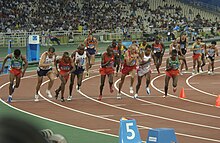Contents
| Men's 10,000 metres at the Games of the XXVIII Olympiad | |||||||||||||
|---|---|---|---|---|---|---|---|---|---|---|---|---|---|
 Olympic Athletics | |||||||||||||
| Venue | Athens Olympic Stadium | ||||||||||||
| Dates | 20 August | ||||||||||||
| Competitors | 24 from 14 nations | ||||||||||||
| Winning time | 27:05.10 OR | ||||||||||||
| Medalists | |||||||||||||
| |||||||||||||

| Athletics at the 2004 Summer Olympics | ||
|---|---|---|
| | ||
| Track events | ||
| 100 m | men | women |
| 200 m | men | women |
| 400 m | men | women |
| 800 m | men | women |
| 1500 m | men | women |
| 5000 m | men | women |
| 10,000 m | men | women |
| 100 m hurdles | women | |
| 110 m hurdles | men | |
| 400 m hurdles | men | women |
| 3000 m steeplechase | men | |
| 4 × 100 m relay | men | women |
| 4 × 400 m relay | men | women |
| Road events | ||
| Marathon | men | women |
| 20 km walk | men | women |
| 50 km walk | men | |
| Field events | ||
| Long jump | men | women |
| Triple jump | men | women |
| High jump | men | women |
| Pole vault | men | women |
| Shot put | men | women |
| Discus throw | men | women |
| Javelin throw | men | women |
| Hammer throw | men | women |
| Combined events | ||
| Heptathlon | women | |
| Decathlon | men | |
| Wheelchair races | ||
The men's 10,000 metres at the 2004 Summer Olympics were held as part of the athletics program at the Athens Olympic Stadium on August 20. [1] No preliminary rounds were held at this distance, since the number of competitors allowed a direct final. [2] The winning margin was 4.29 seconds.
The Ethiopians were in control throughout the distance. A leading group of five runners crystallized. As Kenenisa Bekele and Sileshi Sihine turned up the pace with two kilometres left, Zersenay Tadese, Boniface Kiprop Toroitich and reigning Olympic champion Haile Gebrselassie, who was running with a calf injury, were not able to keep up. Bekele, the world record holder, assured his victory with a brilliant Olympic record finish (27:05.10 minutes), completing the final 400 metres in less than 54 seconds. [3] [4]
